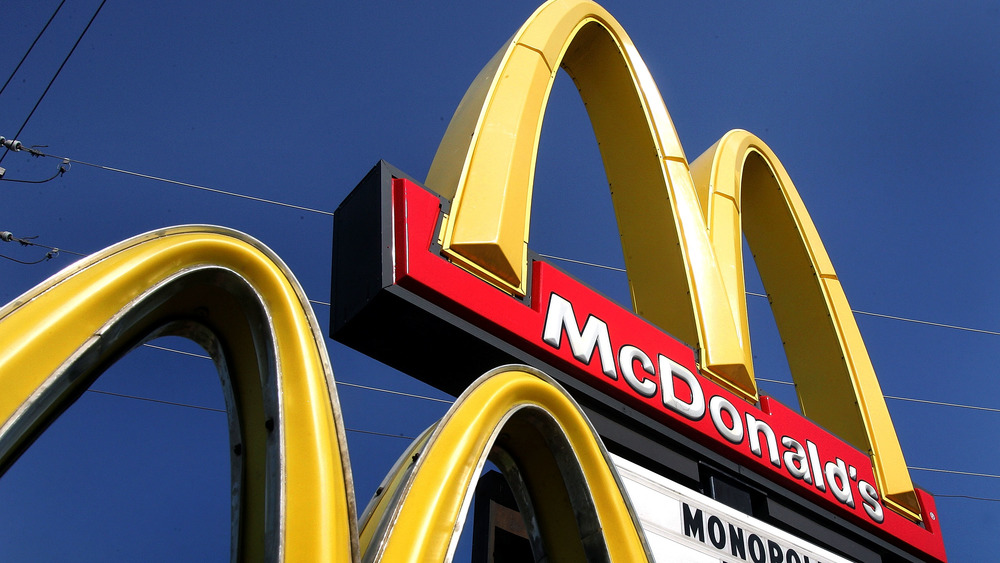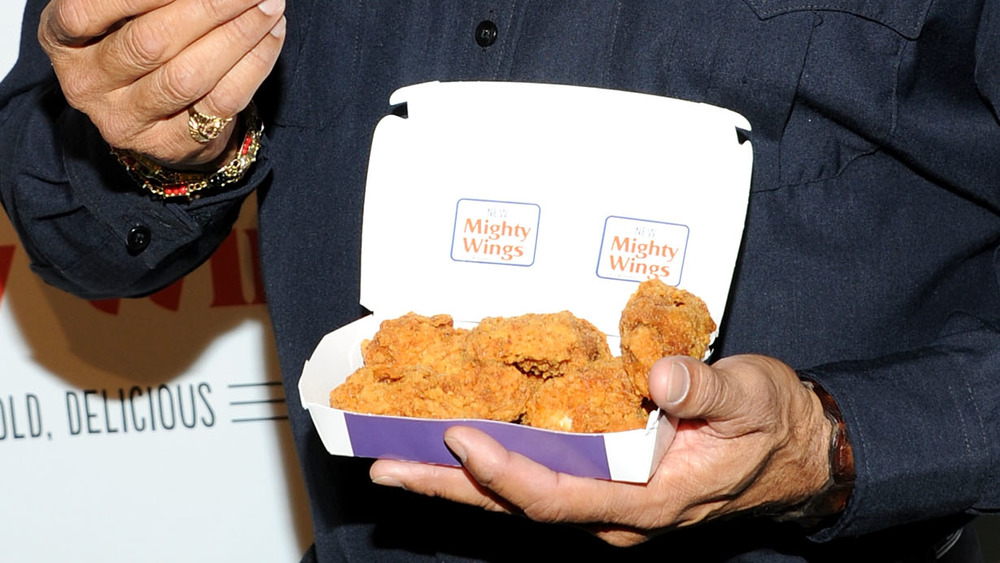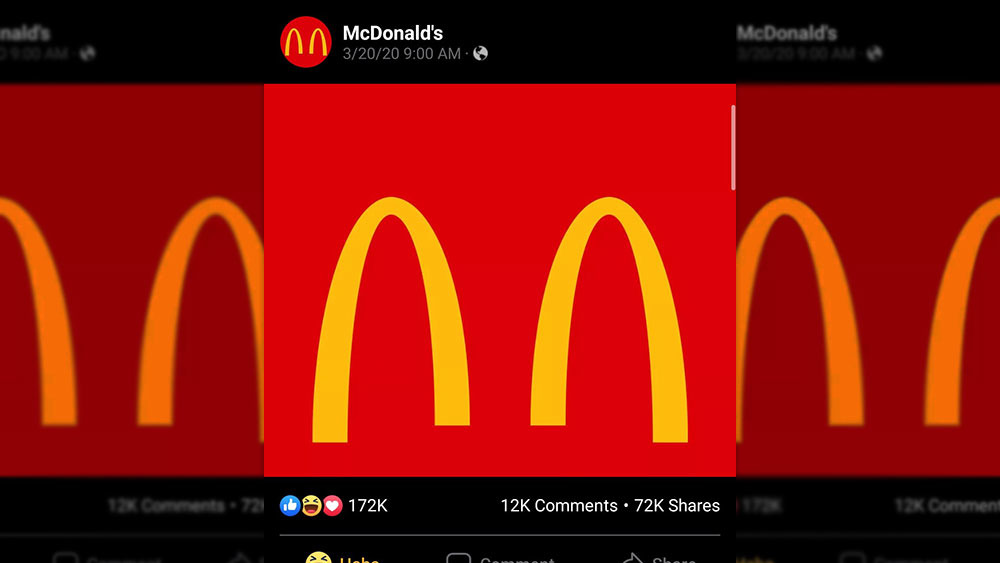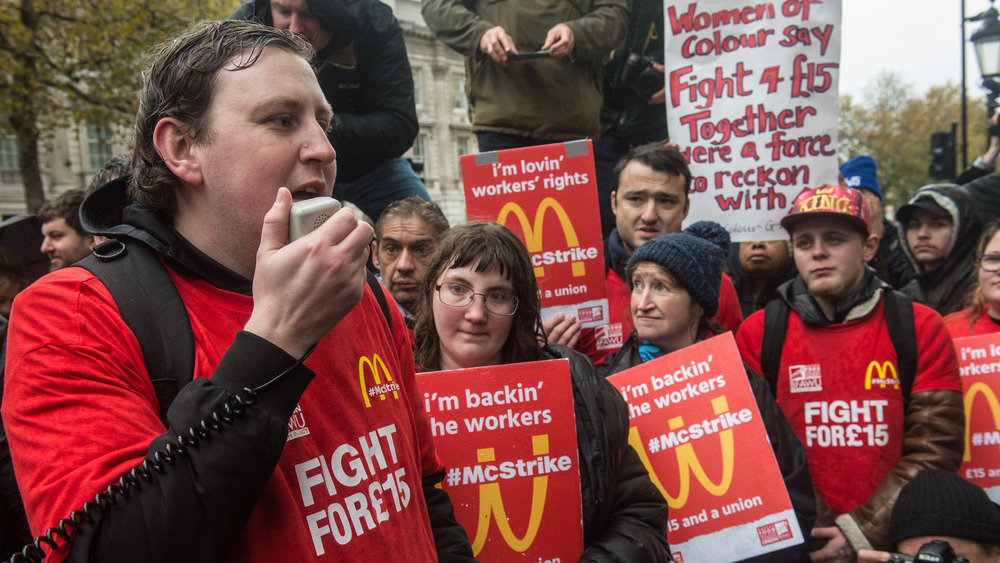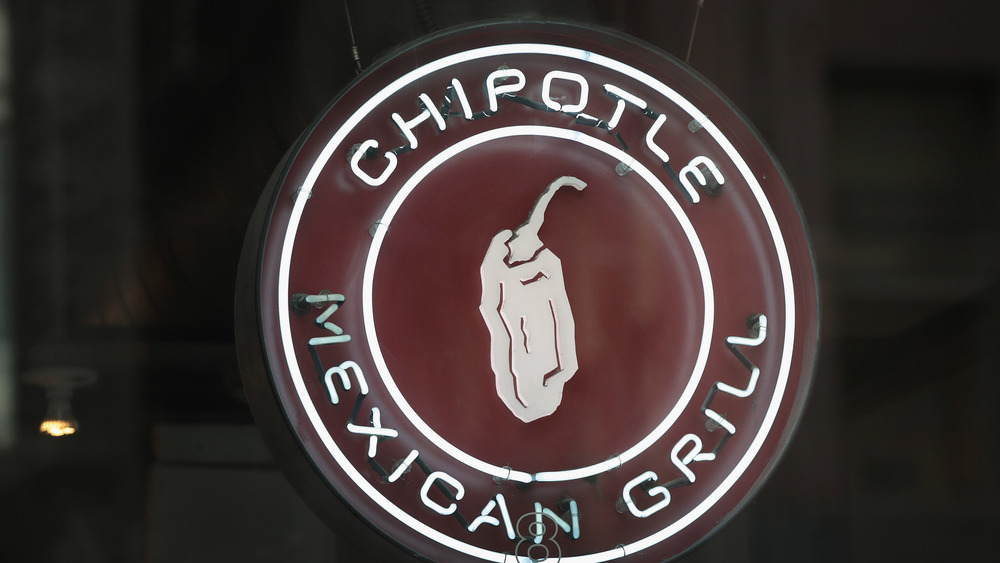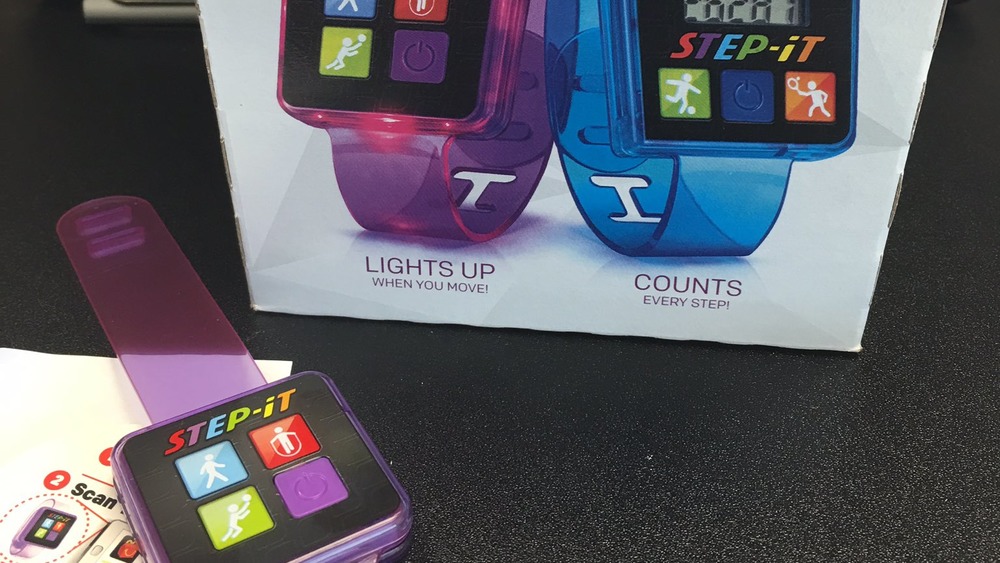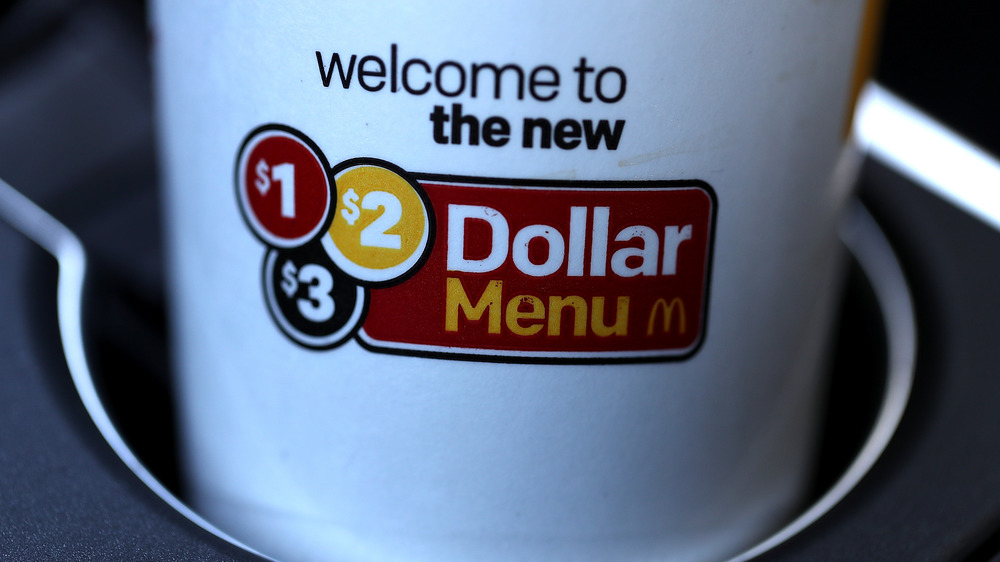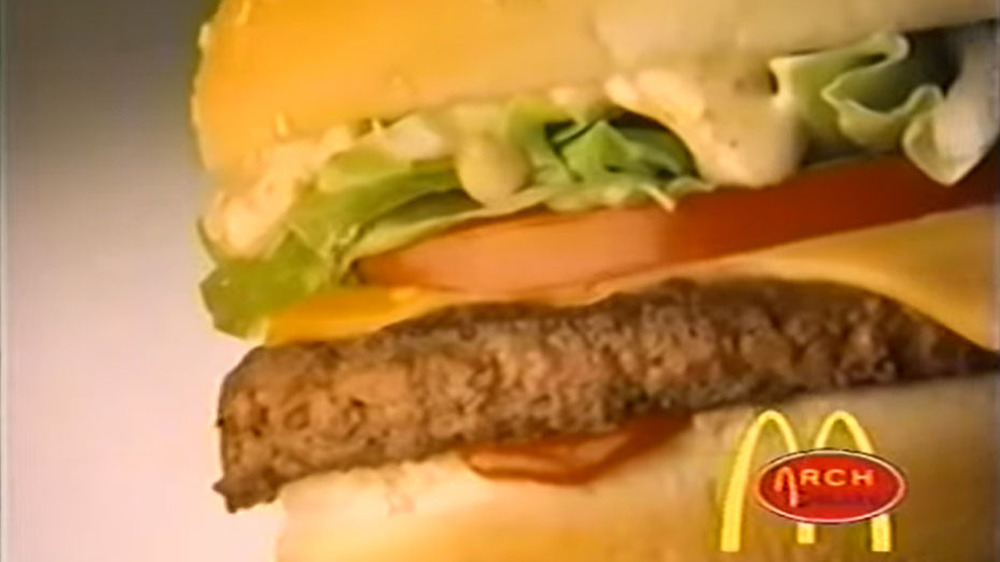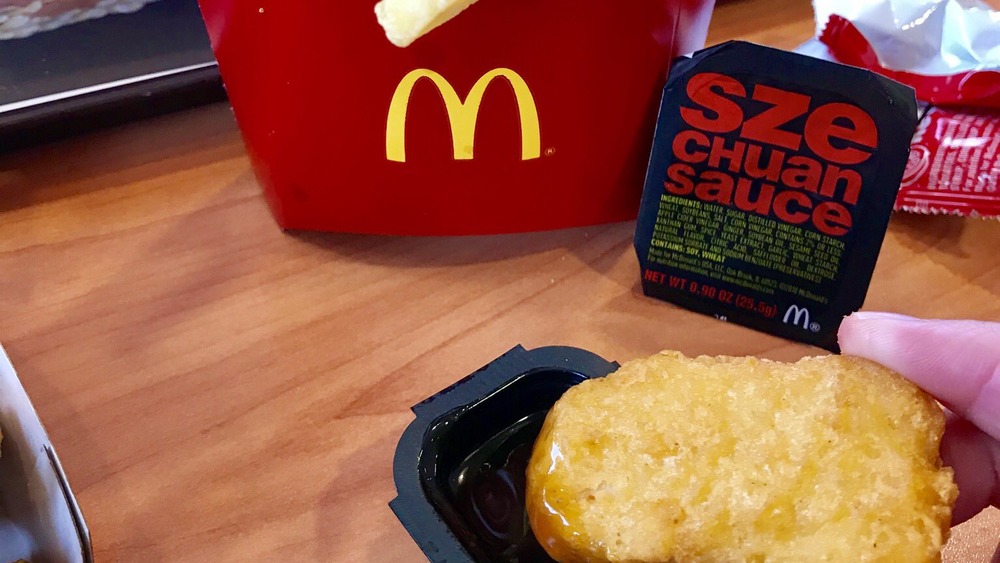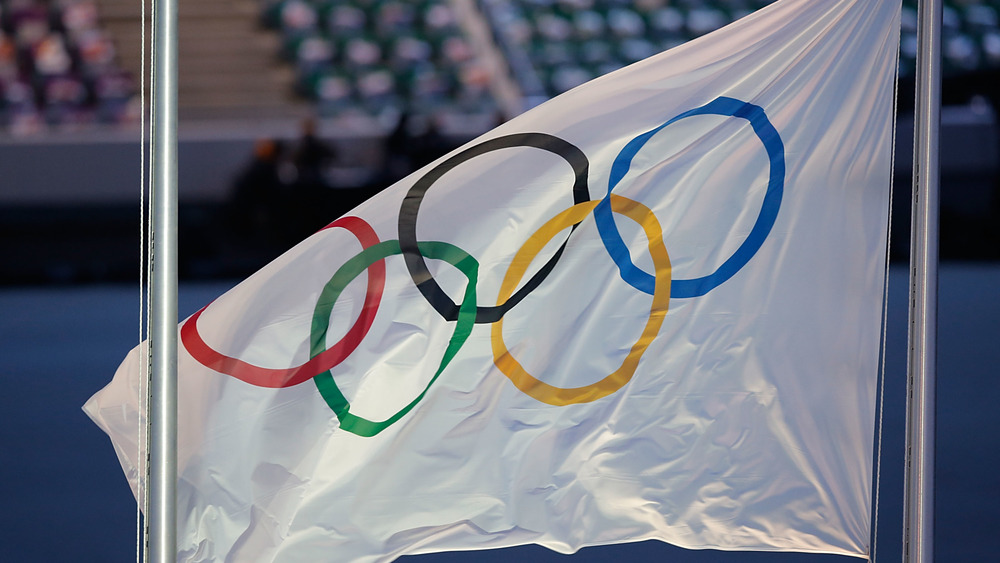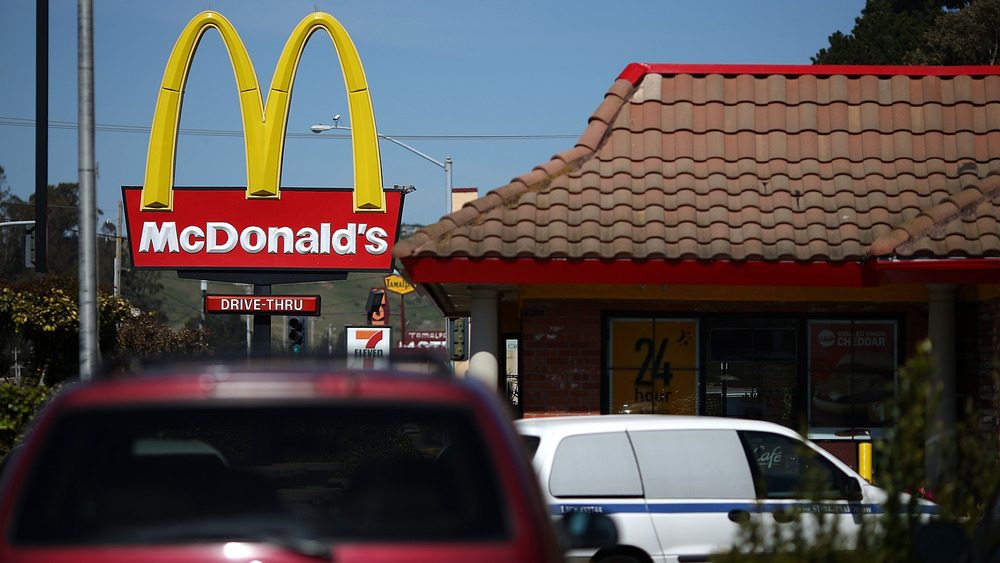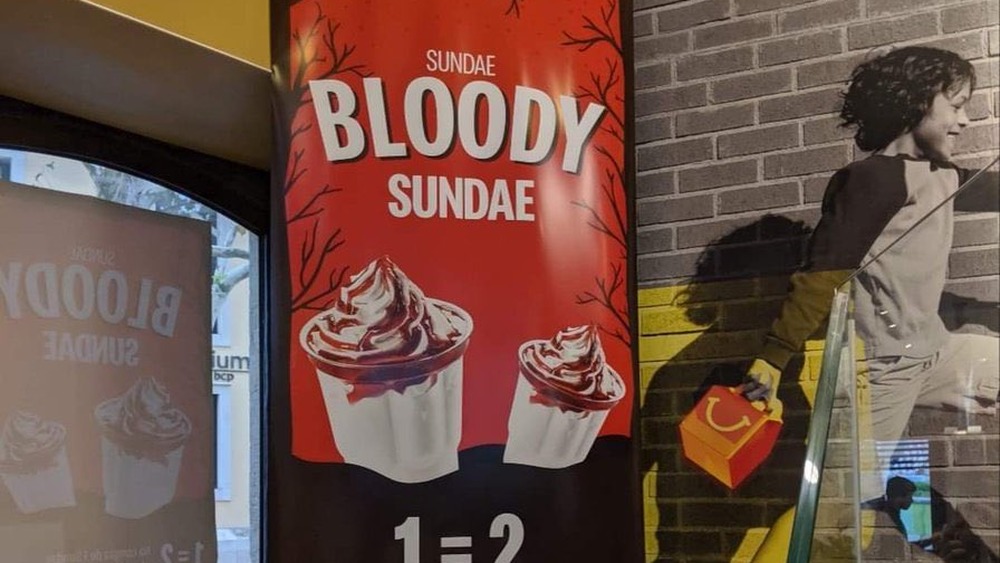McDonald's Decisions That Went Horribly Wrong
McDonald's has made some pretty brilliant choices in its 65 years of business — the Big Mac, the McGriddle, all-day breakfast, the original Dollar Menu, and more. Those were all fantastic things that earned McDonald's major props with fast food fans and helped to make them the biggest fast food giant on the planet. Clearly, Ray Kroc and his successors knew a thing or two about running a business.
For every win that McDonald's has earned over the decades, they've also been saddled with a number of fast food failures and outright terrible decisions that backfired horribly. These terrible decisions have not only cost the company financially, but they've made McDonald's look bad in the public eye (which often results in more financial loss).
No company that has climbed the success ladder as high as McDonald's has done so without some business blunders, though. The entries in this article likely won't be the last bad decisions that McDonald's makes, but they're certainly ones that the company would undoubtedly prefer not to repeat.
McDonald's Mighty Wings were a mighty bad idea
Many mistakes made by global restaurant chains today seem to be limited to social media. While the financial costs of those sorts of blunders isn't often public information, McDonald's has made some pretty horrible decisions that certainly did cost them a hefty penny. One of those poor decisions was the idea to try and take a bite out of the chicken wing market.
In August of 2013, McDonald's re-launched its Mighty Wings. The bone-in wings were sold in packs of three, five, or ten, and cost as little as $2.99 with an array of sauces to choose from. Scott Hume, the editor of the BurgerBusiness blog told USA Today that the wings would make McDonald's a "serious competitor" to KFC and other fast food chicken chains. Well ... they didn't. Mighty Wings failed to take flight with the public.
The wings were too pricey and too spicy for customers' tastes and didn't sell well at all. McDonald's was so confident that their wings would soar to the top of customer orders that they bought 50 million pounds of them before the rollout even began. While the Golden Arches did sell some wings, by December they were still stuck with 10 million unsold wings. The chain would launch them for a third time in limited-release in 2016 — suggesting that McDonald's doesn't always learn from its bad ideas.
McDonald's social distancing ad was especially cringeworthy
Are you ready for a bombshell headline? People hate advertisements. The New York Times piece on this factoid may not be earth-shaking, but McDonald's has certainly found it to be true (more than once). If an advertisement is pandering or virtue signaling, it especially runs the chance of rubbing consumers the wrong way and resulting in a collective eye roll.
When the COVID-19 pandemic hit humanity in 2020, McDonald's decided to get in on the social distancing action with an advertisement that pulled apart its iconic golden logo with the message, "Separated for a moment so that we can always be together." Jumping on the advertising "we're all in this together" bandwagon, the McDonald's message came across as a hollow advertising ploy, largely because of how they treated their employees.
It was a dumb decision from McDonald's, and the billion dollar company was quickly put on notice (via Social Media Dissect). "I don't want your cute logo play McDonalds. I want you offering a million free meals to those in need," said one Twitter user. "Give your workers paid sick leave," tweeted Sen. Bernie Sanders.
The fight against higher wages put McDonald's in a bad light
Even prior to the COVID-19 pandemic, McDonald's had come under fire regarding how much it was paying its hourly workers. The Fight for 15 movement has aimed to secure a minimum wage of $15 per hour for fast food workers, and the group went after Mickey D's hard. Some of those behind the movement accused McDonald's of using intimidation tactics that were aimed at keeping its workers "locked in poverty."
For example, in 2018, Fight for 15 accused McDonald's of coordinating with the police department in Memphis, Tenn., to threaten protesters with arrest, under the alleged authorization of the McDonald's president. In another instance, a franchise owner allegedly joined police officers in "tailing workers" after the protest had ended.
None of it made McDonald's — a multi-billion dollar company — look especially empathetic. To make matters worse, McDonald's lobbied against a minimum wage increase for another year before finally backing down from the fight in early 2019, as reported by CNBC.
McDonald's should have never abandoned Chipotle
McDonald's is still the king of fast food, but the global chain has also been slipping for years. There are a number of factors behind this, but a big one is that more people — especially that coveted millennial market — are opting for healthier food. One of McDonald's biggest mistakes in winning over the fast casual market was abandoning its golden goose — Chipotle.
The relationship between McDonald's and Chipotle is a bit complicated, but here's what you need to know. Way back in 1990, McDonald's invested $50 million in the new burrito chain, and by 2005, they owned 90% of it (via Taste of Home). Just a year later, McDonald's dumped Chipotle for reasons ranging from wanting to focus more on the burger and fry game to Chipotle not being down with the idea of drive-thrus or breakfast. Stupid, stupid McDonald's.
A year later, Chipotle went public, tripled its number of restaurants, and sure enough, grabbed the fast casual market and ran with it. McDonald's did receive $1.5 billion in the Chipotle sale, and while that is a lot of money, it's a lot less than the $17 billion their stake in burritos would have been worth if they'd held onto the Tex-Mex chain.
McDonald's has made some pretty poor Happy Meal choices
McDonald's might serve salads and have oatmeal on its breakfast menu, but c'mon, nobody seriously associates the place with health and fitness. Still, McDonald's is trying to change that image and in 2016, they included "Step It!" fitness tracking bracelets for kids in Happy Meals.
Unfortunately for McDonald's, this fitness tracking toy did more harm than good as it resulted in over 70 reports of various skin burns and irritations. Some 29 million of the fitness tracker bracelets had to be recalled from the chain's United States and Canadian stores. A McDonald's spokesperson said they were "aggressively investigating" the issue and reassured the public that the bracelets were tested and in compliance with government requirements (via USA Today). Parents were encouraged to bring back the bracelets and exchange them for a non-burning toy or apple slices.
This was hardly the first time McDonald's had displayed Happy Meal toy carelessness. In 1982, McDonald's recalled its Playmobil toys because they posed a choking risk. Then, the same thing happened a decade later with its "Doc DeLorean Car." Sadly, this wasn't the end of the toy recalls until the fitness tracker debacle, but nope. A "Scooter Bug" toy in 2001 was also a choking risk, and a 2014 Hello Kitty whistle was deemed too dangerous for kids (via CBS Miami).
The new McDonald's Dollar Menu wasn't well-received
Let's be honest, the McDonald's Dollar Menu was nowhere near the realm of bad ideas from a customer standpoint. It was actually a pretty great idea that pulled customers in for years and altered the landscape of fast food menus. It just wasn't sustainable and annoyed a lot of franchise owners. Rather than let a good thing run its course and retire the Dollar Menu to the company's hall of fame, McDonald's tried to alter its Dollar Menu. This was a bad idea.
McDonald's started altering the price of its Dollar Menu in 2013, and when that didn't solve the problem, they tried the McPick 2 in 2015. Nope, that wasn't the solution either. Eventually, McDonald's pulled its Dollar Menu before bringing it back with $2 and $3 items in 2018. This resulted in sales so terrible that McDonald's had what Inc. called "the single worst day in its company's history," and its stock fell 4.8 percent.
Here's the deal — when "dollar" is in the title of the menu, and people are accustomed to paying $1 for years and years, they're not going to be happy when they're suddenly asked to pay $2 or even $3. That's the thing about fast food customers — they could care less about the strategy cooked up by a team of McDonald's economists.
The Arch Deluxe was a financial failure for McDonald's
In terms of food flops that were terrible decisions, there may be no offender more infamous in McDonald's history than the Arch Deluxe. In the mid-90s, McDonald's was looking at sluggish sales, due to the fact that its primary customer base was still in grade school. Desperate to convince adults that it could deliver adult food, McDonald's introduced the Arch Deluxe, a hamburger with a marketing budget that ballooned to a staggering $200 million (via The New York Times).
Next to other popular burgers on the McDonald's menu like the Big Mac and Quarter Pounder, the Arch Deluxe wasn't all that unique. Bun, beef, cheese, lettuce, tomato, bacon, mustard/mayo, "Arch sauce" ... yep, nothing to groundbreaking really. So what went wrong with this fairly generic burger?
Mostly, it was a matter of the price that failed to deliver the grown-up taste it promised. It averaged around 32 cents more than the Big Mac, and customers weren't convinced that it was a grown-up burger. Being one of the priciest fast food flops of all time, the Arch Deluxe now stands as a prime example of how not to market a new menu item.
The McDonald's Rick and Morty sauce fiasco
Not all of McDonald's efforts in the 1990s were total busts. One of their more popular promotions was their chicken nugget Szechuan dipping sauce that they rolled out in 1998 to coincide with Disney's Mulan movie (via Delish). Rather than bring the sauce back as a regular menu staple, McDonald's decided that a one day promotion in 2017 was adequate enough. Spoiler alert — it was not.
The sauce had been referenced in an episode of Rick and Morty, and McDonald's underestimated just how popular a very limited-time rollout of the sauce would be. Restaurants quickly ran out of the sauce, and fans soon began lashing out at the fast food giant on social media. According to CNBC, some restaurants even had to call the police to handle angry customers. (A bit of an overreaction for dipping sauce? Sure, but people love their McNuggets.)
Other customers were trying to take advantage of McDonald's poor planning and put packets of the sauce on eBay for exuberant amounts of money. What could have been a promotion that made McDonald's look like sauce saviors instead left them looking like complete noobs.
McDonald's became a marketing joke at the 1984 Olympics
In 1984, the Olympics pulled in $200 million with the help of sponsors like M&M/Mars and Coca-Cola. One of those big name sponsors was McDonald's, and while choosing to sponsor the Olympics wasn't a bad idea, how the Golden Arches went about doing so proved to be a horrendous decision.
The idea behind the promotion was that for every medal the U.S. won, fans would have the chance to win a free item if their scratch card matched the Olympic event. A gold medal netted them a Big Mac, silver resulted in free fries, and a bronze medal earned the customer a soft drink. McDonald's launched the campaign with the tagline, "When the U.S. Wins, You Win." And boy, did the U.S. win.
The fault in the campaign was that the U.S. had way less competition that year because the Soviet Union, East Germany, and several other communist countries were boycotting the games. With a large chunk of the competition sitting out, the U.S. crushed the games and scored 174 medals overall. It was simply too much winning for McDonald's to handle, and the free food up for grabs was what The New York Times called "mindboggling."
It was not only a financial hit for McDonald's but made the company the butt of marketing jokes for years to come.
#McDStories set McDonald's up for some nasty social media feedback
In social media's relatively short history, there have been plenty of examples of corporate guffaws. One of those guffaws belongs to McDonald's and its #McDStories promotion launched on Twitter in 2012 (via CBS News). The fast food giant's social media marketing team had the idea that people would use the hashtag to share heartwarming stories of good times with friends and family at McDonald's. It was a dumb idea that only would have worked in a fantasy world where cold fries, long drive-thru lines, and surly employees didn't exist.
It quickly turned into a social media nightmare for the Golden Arches, when people pointed out everything they loathed about McDonald's. Bad food, rude employees, low wages — if it was a gripe, there was likely a McDStories hashtag attached to it.
McDonald's abandoned the campaign incredibly quickly, and it became an example to other companies what not to do when launching a Twitter campaign. Even today, nearly a decade later, you can still find people using the hashtag to point out the fast food giant's shortcomings.
A McDonald's dessert came under fire for being culturally tone deaf
It's safe to assume that the marketing team of a giant corporation like McDonald's probably does a lot of research before launching a new menu item. After all, if it flops they could potentially be out millions of dollars. Not all menu items get a global launch, of course, and that's a good thing considering the backfire the chain endured at their Portugal locations.
In 2019, McDonald's restaurants in Portugal rolled out a Halloween treat called the "Sundae Bloody Sundae," with a blood-red ice cream topping (via CNN). The name was a play on words, but unfortunately, "Sunday Bloody Sunday," also the name of a popular U2 song, refers to a 1972 massacre in Northern Ireland that left 14 people dead. Whoops!
Perhaps if social media didn't exist, nobody would have made much fuss. But that's not the case, and people on Twitter quickly called McDonald's out on the bad marketing move. "Tasteless, like their burgers," said one person. "Wow. What was McDonald's thinking?" added another user. The promotional marketing was obviously scrapped, and McDonald's issued an apology saying its intention was not meant "to upset or insult anyone in any way."
